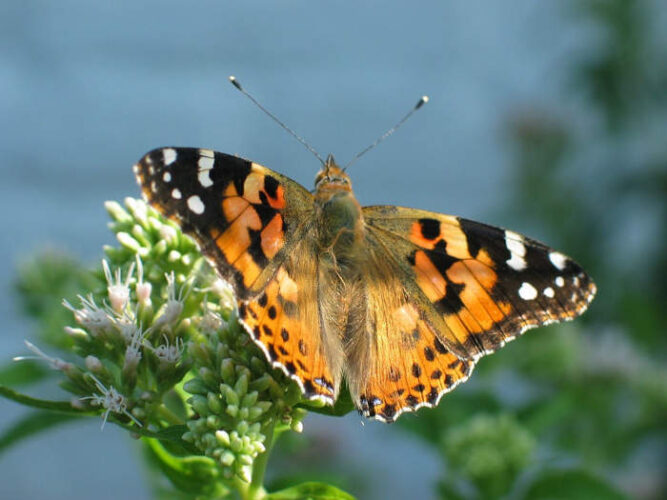(Photograph above of a painted lady butterfly)
A round-up of environmental news that’s been overlooked recently.
By Colin Serjent
Painted lady’s trek is an insect world record
A species of butterfly found in sub-Saharan Africa is able to migrate thousands of miles, passing over the Sahara to the UK and Europe, scientists have discovered.
The painted lady butterfly has been shown for the first time to be capable of making the 8,500 mile round trip – the longest insect migration yet revealed.
Rare Egyptian vulture visits Isles of Scilly
Birdwatchers on the Isles of Scilly caught a glimpse of the first Egyptian vulture on British shores for more than 150 years.
It is thought that the endangered giant bird, which is native to Southern Europe, northern Africa and parts of Asia, flew over from France to the isles off the Cornish coast, after getting confused while migrating.
White-tailed eagles to be reintroduced in England
White-tailed eagles are to be reintroduced in England a century after they became extinct in Britain. Sixty of the juvenile birds of prey, dubbed ‘flying barndoors’ due to their 8 feet wingspan, will be released in west Norfolk over the next decade, said Natural England.
Fast facts: Hummingbirds
Hummingbird wings beat up to 200 times per second, allowing them to hover and feed on nectar-rich flowers. Their hearts beat up to 1,200 times per minute, the human average is about 80. They are the only birds that can fly backwards.
Hummingbirds can flick their tongues into a flower 18 times per second. The tongues are so long that when retracted, they coil inside the birds’ heads around their skulls and eyes.
Ancient beetle find in fossilised faeces
A beetle that lived 230 million years ago has been found in fossilised droppings from what is thought to be a dinosaur ancestor. The extinct Triamyxa coprolithica is the first insect to be found in fossil faeces. The droppings are thought to have come from Silesaurus opolensis. It lived in what is now Poland.
Restored woodland hosts rare butterflies
A colony of one of the UK’s rarest butterflies has been found in woodland where restoration work has helped wildlife to return. The heath fritillaries are thriving at the Woodland Trust’s Victory Wood in Kent. The ancient site, which was earmarked as a landfill, was saved by the charity in 2004.
Bird population in Britain on a dramatic downward curve
Over the past fifty years, Britain’s bird population has declined by over 40 million, with some species being brought close to extinction: turtle doves and golden orioles, for example.
The fate of the nation’s common birds, such as the sparrow, starling and curlew is a serious issue. Twenty years ago there were millions of them in Britain. That number has dramatically fallen.
